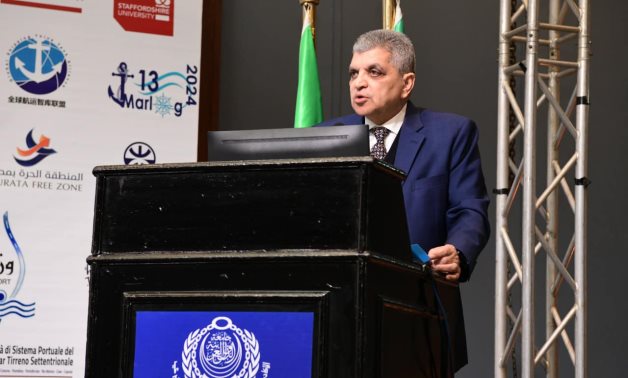
Chairman of the Suez Canal Authority Admiral Osama Rabie participated, on Sunday, in the opening of the activities of the thirteenth annual conference on Sustainable Green Blue Infrastructure (MARLOG 13)
CAIRO – March 3, 2024: Chairman of the Suez Canal Authority (SCA) Admiral Osama Rabie participated in the opening of the thirteenth annual conference on Sustainable Green Blue Infrastructure (MARLOG 13) on Sunday.
The conference, organized by the Arab Academy for Science, Technology and Maritime Transport under the auspices of the League of Arab States and in cooperation with the Ministry of Transport, is scheduled to run from March 3 to March 5.
In his address, Rabie highlighted the commitment of the Suez Canal to the principles of the blue economy, as outlined in its ambitious "Green Canal 2030" strategy launched in 2020. This strategy aims to transform the Suez Canal into an eco-friendly waterway, reducing carbon emissions for vessels traveling between Asia and Europe. Rabie noted that the Suez Canal achieved a significant reduction of 55 million tons of carbon emissions and a decrease in fuel consumption by 17 million tons in 2023.
Rabie also emphasized the efforts of the Suez Canal Authority to promote the use of clean energy across its facilities and units. Additionally, a new initiative has been launched to collect waste from ships passing through the canal in collaboration with Greek Antipollution – Environmental Protection Services.
The Suez Canal has witnessed unprecedented development in recent years, with numerous projects aimed at enhancing the navigational channel and associated infrastructure. These efforts are part of a broader strategy to provide comprehensive maritime services, including the development of the southern sector of the canal, which is expected to increase navigational safety by 28%. Furthermore, plans are underway to construct and develop three marinas for yachts in the canal cities.
Addressing the security and geopolitical tensions in the Red Sea and Bab al-Mandab region, Rabie highlighted the impact on freight prices and shipping costs. The price of freight for ships heading to Red Sea ports has risen to $6,800 per container, compared to $750 per container before the crisis. Additionally, fuel and insurance costs have surged, posing unprecedented challenges to the maritime transport industry and affecting navigation rates in the Suez Canal.
In response to the crisis, the Suez Canal Authority has held meetings with various stakeholders to address disruptions in global supply chains. Efforts have focused on mitigating the impact of prolonged journey times via the Cape of Good Hope route and addressing the lack of ports and logistical services along this route.
Rabie reiterated the commitment of the Suez Canal Authority to support its customers during times of crisis, highlighting the implementation of marine mechanisms and services to minimize the repercussions. These measures include providing ship repair and maintenance services, supplying fuel, food, water, ambulance services, marine rescue, and pollution control.
The Red Sea region has experienced turmoil following attacks by the Houthi Military on vessels with Israeli affiliations amidst the ongoing Israeli conflict in the Gaza Strip. Tensions escalated further after the US and the UK conducted strikes on targets in Yemen, exacerbating the crisis of international maritime navigation through the Red Sea and the Suez Canal.
Comments
Leave a Comment